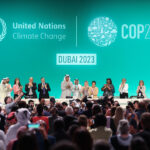Posts tagged with 'Turkey'
Much of Europe sweltered in August 2025 as a heat dome spread across the continent, pushing peak afternoon temperatures to over 40 degrees C (104 degrees F) in France and Spain. Meanwhile, parts of Greece, Turkey and Albania battled historic and devastating ...

In Istanbul’s Caferağa neighborhood, WRI Türkiye led a community-driven initiative to create a more sustainable, inclusive and livable urban environment. From April 2023 to July 2024, the Livable Caferağa project worked closely with residents to understand the neighborhood’s challenges around overcrowding, ...

Istanbul’s Caferağa neighborhood has a longstanding reputation for its cultural richness and historic charm. Quaint cafes, restaurants and bars line the sidewalks. A thriving arts scene draws an eclectic crowd. More than 2.3 million visitors daily flock to the district ...

Europe is the world’s fastest warming continent, which is severely impacting cities and leading to tens of thousands of deaths, rising hospitalizations, school closures and people adjusting their lives to avoid inhospitable outdoor conditions. The oppressive heat is being felt across the ...

Daily commutes via car have evolved into more than mere trips – they greatly influence both our mental and physical well-being. Research shows that relentless car journeys don’t just occupy our time, they significantly shape our mood and overall outlook ...

In March 2024, the inaugural Buildings and Climate Global Forum convened more than 1,000 participants to spur action towards built environment decarbonization and resilience. The first-of-its-kind forum was welcome, as the sector needs a shakeup. The big issue on the table was ...

For a woman living in an African city, public transport can be a daunting experience. Women usually plan their trips in advance, and consider a multitude of factors before setting out: What is the safest way to reach the bus ...

Although it is widely recognized that gender disparities are echoed in the design and operation of urban transportation systems, gender-responsive transportation planning is still in its early stages. Drawing from the TOPUK project, which stands for “Women Accessing Public Transport,” ...

By David Waskow, Jennifer Layke, Nate Warszawski, Preety Bhandari, Gabrielle Swaby, Natalia Alayza, Jamal Srouji, Mario Julien Díaz, Edward Davey, Rogier van den Berg, Roman Czebiniak, Paige Langer and Nathan Cogswell on December 19, 2023
The COP28 climate talks began with a new fund to address the increasingly severe losses and damage vulnerable countries face from climate impacts and concluded with the first international agreement to tackle climate change’s main driver: fossil fuels. Those bookends to the Dubai summit ...

New data from WRI’s Aqueduct Water Risk Atlas show that 25 countries — housing one-quarter of the global population — face extremely high water stress each year, regularly using up almost their entire available water supply. And at least 50% of the ...

Today’s city leaders face a level of complexity and rapid pace of change that can be overwhelming. Particularly in developing countries, urbanization is unfolding quickly and often haphazardly. One in three urban residents worldwide lack adequate access to at least ...

For decades, urban transportation policy and practitioners have favored a model of analysis that prioritizes increasing the speed of vehicles and the time saved for people as a result. While this may make sense on an intuitive level, it is ...

While building construction and operations are among the largest contributors to climate change, accounting for nearly 40% of energy-related CO2 emissions globally, they also remain the most cost-effective climate mitigation solution available. Every $1 invested in efficiency saves $2 in ...

Metropolitan areas around the world struggle with the same problem: More people means more traffic. If the majority of residents and workers use private vehicles, this leads to more congestion and emissions, more road crashes, lower air quality and therefore ...

Can a city where pedestrians, cyclists and children get injured or killed on the roads be a truly sustainable one? Given the rapid urbanization of the world’s population, road safety is a critical development and sustainability issue. This episode of ...


























